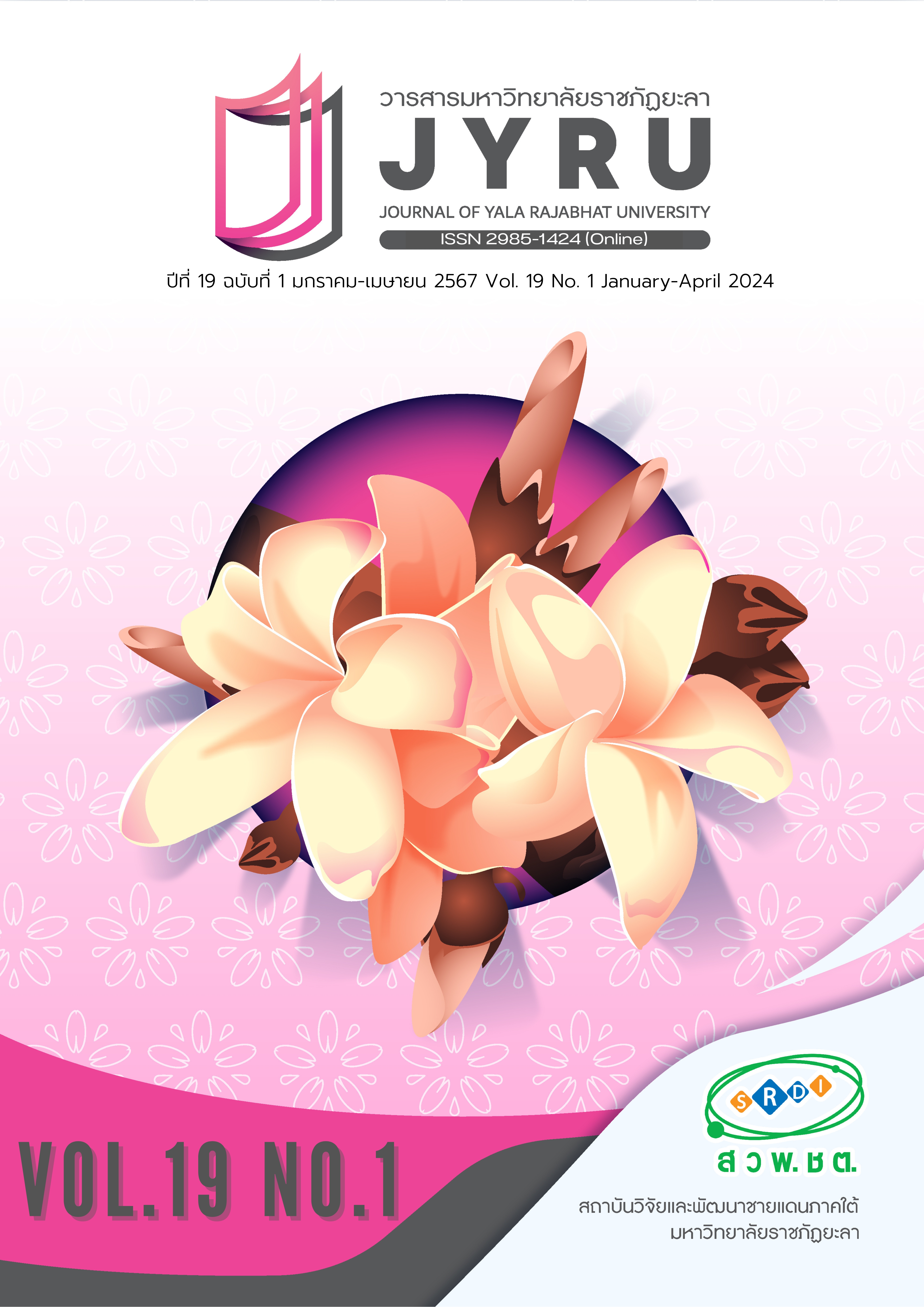การพัฒนารูปแบบการเรียนการสอนตามแนวคิดการเรียนรู้เชิงรุก เพื่อส่งเสริมทักษะการคิดขั้นสูงในวิชาประวัติศาสตร์ สำหรับนักเรียนโรงเรียนขนาดเล็ก
Main Article Content
บทคัดย่อ
การส่งเสริมทักษะการคิดขั้นสูงในวิชาประวัติศาสตร์ ควรต้องมีรูปแบบการสอนที่เหมาะสม ดังนั้นการวิจัยครั้งนี้ จึงเป็นการวิจัยทดลองที่มีวัตถุประสงค์ในการพัฒนารูปแบบการเรียนการสอนตามแนวคิดการเรียนรู้เชิงรุก เพื่อส่งเสริมทักษะการคิดขั้นสูงในวิชาประวัติศาสตร์ สำหรับนักเรียนโรงเรียนขนาดเล็ก และศึกษาผลการใช้รูปแบบการเรียนการสอนตามแนวคิดการเรียนรู้เชิงรุก เพื่อส่งเสริมทักษะการคิดขั้นสูงในวิชาประวัติศาสตร์ ผลการวิเคราะห์พบว่า รูปแบบการเรียนการสอนตามแนวคิดการเรียนรู้เชิงรุก มีกระบวนการจัดการเรียนการสอน 5 ขั้นตอน คือ การระบุปัญหาประวัติศาสตร์การรวบรวมข้อมูลประวัติศาสตร์ การไตร่ตรองข้อมูลประวัติศาสตร์ การเลือกข้อสรุปประวัติศาสตร์ และการแลกเปลี่ยนข้อมูลประวัติศาสตร์ และผลของรูปแบบพบว่า หลังเรียนตามรูปแบบนักเรียนกลุ่มทดลอง มีผลสัมฤทธิ์ทางการเรียนประวัติศาสตร์ สูงกว่าก่อนเรียน (p < 0.05) หลังเรียนตามรูปแบบนักเรียนกลุ่มทดลองมีทักษะการคิดขั้นสูงในวิชาประวัติศาสตร์สูงกว่าก่อนเรียน (p < 0.05) และครูในโรงเรียนขนาดเล็กกลุ่มทดลอง มีความคิดเห็นต่อการจัดการเรียนการสอน โดยใช้รูปแบบอยู่ในระดับมากที่สุด ผลดังกล่าวสามารถอธิบายได้ว่า รูปแบบการเรียนการสอนที่ได้พัฒนา มีองค์ประกอบสำคัญคือ การจัดการเรียนรู้อย่างกระตือรือร้น นักเรียนลงมือปฏิบัติจริงในวิชาประวัติศาสตร์ การแลกเปลี่ยนความรู้จากการคิดร่วมกัน นักเรียนประยุกต์ใช้ความรู้ ที่สามารถนำไปเป็นแนวทางให้ครูได้พัฒนารูปแบบการเรียนการสอนที่เน้นผู้เรียนเป็นสำคัญในวิชาอื่นต่อไป
Article Details

อนุญาตภายใต้เงื่อนไข Creative Commons Attribution-NonCommercial-NoDerivatives 4.0 International License.
บทความ ข้อมูล เนื้อหา รูปภาพ ฯลฯ ที่ได้รับการเผยแพร่ในวารสารมหาวิทยาลัยราชภัฏยะลานี้ ถือเป็นลิขสิทธิ์ของวารสารมหาวิทยาลัยราชภัฏยะลา หากบุคคลหรือหน่วยงานใดต้องการนำทั้งหมดหรือส่วนหนึ่งส่วนใดไปเผยแพร่ต่อหรือกระทำการใดๆ จะต้องได้รับอนุญาตเป็นลายลักษณ์อักษรจากวารสารมหาวิทยาลัยราชภัฏยะลาก่อนเท่านั้น
เอกสารอ้างอิง
Aiemphaya, K., Noymanee, N. & Onkasem, P. (2022). The small schools: Issues to be decided. Sirindhorn Review Journal, 23(1), 315-329.
Akman, O. (2016). Status of the usage of active learning and teaching method and techniques by social studies teachers. Universal Journal of Educational Research, 4(7), 1553-1562.
Charoenyot, S., Ninlaphun, M. & Pattaphol, M. (2020). Development of a learning management model according to active learning approach to enhance the concept of learning chemistry and critical thinking skills of high school students. Suthiparitat Journal, 34(109), 46-57. (in Thai)
Chodok, S. & Sirisamphan, O. (2022). Development of a learning management model for local history based on the concept history tells to promote shared historical sensibility for high school students. Journal of Human Social Review (NSP.), 24(1), 57-77. (in Thai)
Haniah, A. R., Aman & Setiawan, R. (2020). Integration of strengthening of character education and higher order thinking skills in history learning. Journal of Education and Learning (EduLearn), 14(2), 183-190.
Ibrahim, N., Safitri, D., Nuraini, S. & Rihatno, T. (2020). Introducing a model of student critical thinking skills in history education. International Journal of Advanced Science and Technology, 29(8), 88-96.
Ishii, T. (2022 ). The future of Japanese schools as a community: points of discussion on the liberalization and personalization of education and the small school’s debate. educational studies in japan: International Yearbook, 161)), 147-164.
Issar, K. (2021). Students’ attitude towards studying history and teaching practices. In: Education Quarterly Reviews, 4(3), 45-50.
Kaewkongpan, D. (2019). The development of higher thinking skills for junior high school students managed proactive learning in mae tha district, Lampang province. Journal of Education Industry, 18(2), 31-39. (in Thai)
Kongjan, A. & Suksai, L. (2021). Study of academic achievement, learning unit important public holidays and analytical thinking of Prathom Suksa 3 Students by learning modeling. Academic Journal of MBU; Lanna Campus, 10(1), 48-57. (in Thai)
Kruse, K. (2012). Instruction to instruction design and Addie model. [Online]. Retrieved February 10, 2018. form: http://www.transformativedesigns.com/id_systems.html.
Office of the Secretariat of the Council of Education. (2017). National education plan 2017–2036. Bangkok: The Secretariat of the Council study.
Özcan, P. (2020). The effect of critical thinking education on the critical thinking skills and the critical thinking dispositions of preservice teachers. Educational Research and Reviews, 15(10), 606-627.
Phinla, W. (2017). Guidelines for social studies learning management. to develop critical thinking skills for learner in the century 21. Parichart Journal Thaksin University, 30(1), 13–34. (in Thai)
Pratama, R. A., Pratiwi, I. M., Saputra, M. A. & Sumargono. (2022). Integration of STEM Education in History learning. International Journal of Evaluation and Research in Education, 11(1), 313-320.
Secondary Educational Service Area Office 2. (2019). Report on the results of basic national educational testing o-net year, education 2019. Bangkok: Secondary Education Service Area Office 2. (in Thai)
Setiawan, J., Sudrajat, A., Aman, & Kumalasari, D. (2021). Development of higher-order thinking skill assessment instruments in learning Indonesian history. International Journal of Evaluation and Research in Education, 10(2), 545-552.
Singphen, T., Poopayang, P., Siphai, P. & Charoensuk, P. (2019). Strategic leadership factors of School administrators influencing the effectiveness of small-sized schools. International Journal of Educational Administration and Policy Studies, 11(3), 20-28.
Sutimin, L. A., Joebagio, H., Sariyatun, Hum S. M. & Abidin N. F. (2018). The development of a deconstructive learning history model to promote the higher-order thinking skill of university students. The New Educational Review, 51(1), 19-27.
Wynn, C. (2022). Facilitating post formal thinking through problem-based learning in the history survey course: an empirically tested PBL model. Journal of Problem-Based Learning in Higher Education, 10(1), 121-133.


